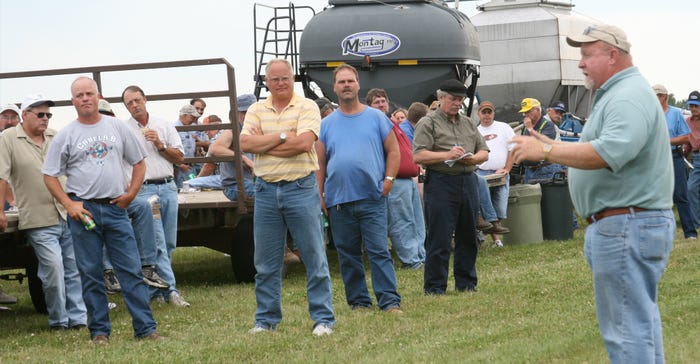July 26, 2019

Iowa Learning Farms, housed at Iowa State University, celebrates 15 years of service in 2019. Established in 2004, ILF is building a “culture of conservation” by encouraging adoption of conservation practices.
Farmers, researchers and ILF team members work together to identify and implement best management practices to improve water quality and soil health while remaining profitable.
Throughout 2019, ILF will be sharing stories about the contributors, history and successes of ILF and its partner program Water Rocks!
Jim Gillespie
Jim Gillespie, director of the Division of Soil Conservation and Water Quality for the Iowa Department of Agriculture and Land Stewardship, now retired, was the field services bureau chief for IDALS as ILF was starting up in 2004.
He regularly participated with the ILF leadership team in discussions and activities from the beginning and helped forge strong ties with the IDALS management team. He continued to support and contribute to ILF initiatives until his retirement in 2018 and continues to have a strong interest in the activities and progress of the organization.
What was your involvement and role with ILF? ILF was not my brainchild, but I was very lucky to be able to contribute and participate from the beginning. I didn’t have a direct management role but found myself consistently reaching out to ILF with questions and participating in fruitful discussions about partnering between ISU, conservation districts and other entities throughout the state.
I like to think I contributed, but I also learned quickly that ILF was a valuable resource for the state of Iowa that provided excellent information garnered from their close work with ag producers. The ILF approach and success melded well with the state’s goals and objectives.
What was the purpose of ILF during your involvement? From the beginning, ILF placed great emphasis on establishing and promoting the concept of farmers helping farmers and peers helping peers. The purpose was — and is — to get information into the hands and minds of producers. Farmers like to share information and experiences with each other and often give more credence and respect to what is learned from a peer than when the same information is presented as a research report.
Through the evolution of ILF outreach activities, field days and reports, the organization has continued to innovate while maintaining its core approach to delivering information and services and promote efforts to build a “culture of conservation” in and beyond Iowa.
How did you change the program, and how did it change you? Working with ILF gave me an opportunity to get out of the office and work with farmers across the state. My typical role was working with staff members, agency folks and partners to deliver a service to farmers, not to work directly with farmers. Connecting directly with farmers helped me to learn and better understand where they were coming from, what was important to them on business and personal levels, and how programs might best serve their needs.
I think this experience helped lead to better models and ways to promote successes while addressing concerns from the producer community. I’m not sure I had as much of an impact on ILF as it had on me, but I would not trade the experiences for anything.
What are your fondest memories of working with ILF? Having the opportunity to watch and work with the ILF staff was always impressive and fun. Watching the precision of the team setting up and conducting field days never ceased to amaze. The dedication and commitment from every member of the ILF team shows through in the quality of programming. They all saw the potential and whole-heartedly supported each other’s ideas to build and grow the program.
And I loved working with the farmer-partners. There was so much to learn from their passion for conservation and real-world experiences — with successes and failures in real time.
Why are water quality and conservation outreach important to you and to Iowa? I grew up on a farm and worked on farms. I’ve always maintained a connection to farming and the land, including a more than 40-year career in agriculture. I began my career in agriculture as a vocational ag teacher and became engaged in conservation as a field representative for soil conservation and water quality. My experiences helped me to see and understand the issues from the perspectives of landowners, farmers and conservationists.
The priorities don’t always align, but everyone must work together to take care of our resources. Because if they don’t, the incompatibly between the business of farming and the greater needs of the community will bring about more dire consequences.
We are blessed with some of the best land in the world. We currently have sufficient water and great soil to support agriculture and community needs. If we can’t or don’t protect these resources, the future could be bleak.
If you could look 15 years into the future, what one thing would you like to see as a result of ILF activities? I’d like to see much more diversification in agriculture. ILF could be of great service in moving toward this goal. We’re locked into a monoculture system of corn and beans. Wouldn’t it be nice if Iowa had the ability to diversify into other commodities that could fit into a rotation that would improve soil health and promote better water quality, but still make a viable business?
Is there anything else you’d like to share about ILF? ILF gave a breath of freshness to Extension services. Their approach to engagement and education through partnering with farmers has helped strengthen the connection between research and practical application. ILF has also helped to reinforce the role of ISU Extension as a noncommercially biased resource and revitalize the reputation of Extension as a trusted partner and resource.
Source: ILF, which is responsible for information provided and is owned by the source. Informa Business Media and subsidiaries aren’t responsible for any content in this information asset.
You May Also Like




